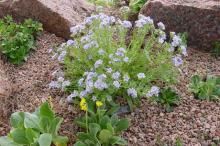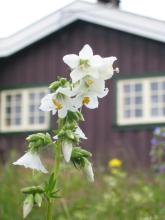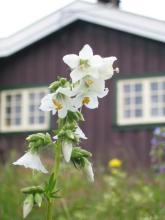Not quite as congested as the sky pilots, this frilly leaved Polemonium pulcherrimum is widespread through the montane elevations of the Northern Rockies. I first collected seed near Dog Gone Lake (I kid you not) in Montana where it grew thickly under the pines and spruce. It thrives in the same sort of conditions that suit Auricula primulas and Heucheras--well drained high shade--and has lasted for years in my rock garden. I think it may be my favorite Polemonium, one well worth seeking out. Particularly this Dog Gone form...which blooms much of the spring and often through much of the summer.
By the way, the Latin name means "extremely beautiful" which I would agree with.
Comments
Re: One dog gone fine Polemonium!
The flower stems look like they would be beaten down by rain. True?
And our native Polemonium reptans (Jacob's Ladder) opens only when it is sunny. How does P.pulcherrimum act in this regard?
The flowers themselves are prettier on pulcherrimum than on reptans, but I'm just not sold yet on the species "dog gone fineness". I briefly grew P. p. 'Blue Master' (bought under the name P.folissima [or similar]). It seemed like a more sturdy and taller plant.
Re: One dog gone fine Polemonium!
The flower stems look like they would be beaten down by rain. True?
I can't say I have noticed any permanent damage from a pounding rain. Therefore, I'd guess the stems are rather springy?
And our native Polemonium reptans (Jacob's Ladder) opens only when it is sunny. How does P.pulcherrimum act in this regard?
Errr, not something I've noticed either...
The flowers themselves are prettier on pulcherrimum than on reptans, but I'm just not sold yet on the species "dog gone fineness". I briefly grew P. p. 'Blue Master' (bought under the name P.folissima [or similar]). It seemed like a more sturdy and taller plant.
The species gets to about 8" in my yard, slightly lax (a little wider than tall).
Re: One dog gone fine Polemonium!
Our most common native Jacob's ladder, P caeruleum, is one of the best perennials for montane climate. It is spreading at our mountain cabin. We also have a white version of it.
I have tried the American species P pauciflorum. It behaves well but is a short lived perennial here.
Maybe I should try P pulcherrimum as well!
Re: One dog gone fine Polemonium!
I came across these excellent photos of Polemonium pulcherrimum on Marijn can der Brink's photo galleries, taken at Crater Lake National Park, Oregon.
http://photos.v-d-brink.eu/Flora-and-Fauna/North-America/America-Oregon/...
http://photos.v-d-brink.eu/Flora-and-Fauna/North-America/America-Oregon/...
http://photos.v-d-brink.eu/Flora-and-Fauna/North-America/America-Oregon/...
http://photos.v-d-brink.eu/Flora-and-Fauna/North-America/America-Oregon/...
The photos on van der Brink's
The photos on van der Brink's site show P. pulcherrimum var. pulcherrimum, but the plants under discussion look like P. pulcherrimum var. delicatum.
I spent years weeding the latter out of my troughs. True, it was pretty, but 50,000 of pretty can quickly turn into something else.
The variety with small, congested leaves (var. pulcherrimum) growing in full sun on rocky slopes looks like a desirable plant, equal to P. viscosum, P. brandegei, and P. chartaceum.
Bob
"forgive the lateness of my reply"
Ah, very interesting! Yes,
Ah, very interesting! Glad someone is reviving some of these old threads.
Hmm, the plant photos I posted from the mountains west of Calgary are claimed to be P. pulcherrimum var. pulcherrimum by USDA Plants (the only variety said to occur here... though it says "subspecies" rather than "variety")... the leaves look rather large and loose though. I see it in higher elevation grassland-ish and forest edge areas. (Just realized I'm not sure I'm following... something I find occurring more and more frequently, to my dismay.)
What interested me were the
What interested me were the photos on van der Brink's site, which didn't look like any of the thousand plants I weeded out of one trough many years ago, and so I looked at Intermtn Flora Vol. 4, p.90, and there does seem to be a difference between var. delicatum and the trough-worthy var. pulcherrimum.
Seems to be two distinct plants as far as I can see; one inhabiting woodlands, etc., and a cushion plant growing on rocks or whatever, in full sun. A search on CalPhotos shows two easily distinguished forms. Url below.
Bob
http://tinyurl.com/oxdh3v2




We have mixed results with western Polemoniums...they may do fine then suddenly up and die in mid-summer...that is assuming they survive the winter. Pulcherrimum is one of the more reliable but is still apt to be short-lived around here. I have a couple but they are not even showing buds yet.